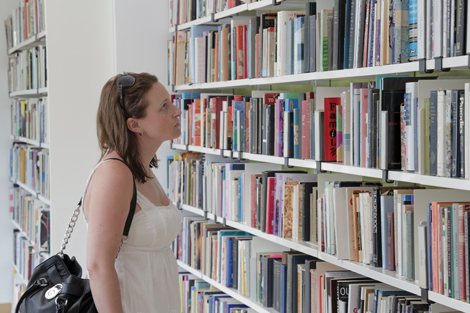A quivering grid of afternoon sunlight shifts across the polished hardwood floor of a long narrow room. But for the drowsy hum of the air conditioner, all is silence and stillness, an ambience ideally conducive to the reception and refinement of clear thought. Immersed in scholarly retreat, an owlish old man with a malodorous rucksack occupies an armchair. Students stretch out on sofas; others sit at desks that border the room, pecking at laptops or scribbling in notebooks. A display of books by the greats—Milton, Herbert, Dickinson, Eliot—line the window ledges like poetic ramparts against the world outside, where crowds flock Battery Park and ferries traverse the glittering Hudson toward the skyline of Jersey City beyond.
It is unusual to find this many people (today, at least 10) gathered in silent contemplation of the written word. The Poets House is not a library—books can only be perused on-site —but it is laid out like one, and unlike most libraries nowadays, which often seem more like video arcades or children’s playgrounds, this one has only one public computer on the premises, for accessing the data base—strictly no Internet use, as I found out when rebuked by an intern for browsing a horse-racing site. The Poets House, naturally, houses only poetry, that most ignored and impractical of the arts: more than 50,000 volumes of it, and growing.
It is difficult to get the news from poems, yet men die miserably every day for lack of what is found there.
—William Carlos Williams
With weighty biographies and critical studies thrown in, Blake, Whitman, Stevens and other prolific heavy-hitters take up one or two shelves on their own. Less predictably—with Kleist above and Koch below—the works of Bill Knott occupy almost an entire row, the black lettering on many of the thick white spines shamelessly flaunting the Lulu imprint. The open-door policy results in a preponderance of self-published books. Aisles of obscurity, shelves of neglect, florilegiums of futility, all meticulously alphabetized: a repository of poets who thought their thoughts worth recording, their words worth sharing.
“So many had sacrificed themselves for art without even their names surviving. On the other hand, what mattered most was that all who had given themselves to their work had their real reward in having actualized themselves.” Easy enough for John Berryman to say, considering his place in the pantheon, but perhaps not particularly comforting to poets whose efforts at self-actualization have never advanced beyond open mic nights in empty coffee houses and years on end of polite rejection from little magazines that almost nobody reads.
I open the Collected Poems of Tim Dlugos at a random page: “Attacked by people I admire/as a poseur, or knave, or liar/perceived as dry, or shrill, or bored/or (worst of all) roundly ignored.” Which seems to sum up the poet’s lot. Resentment or indifference are the usual reward for crafting felicitous lines, and—it goes without saying—a complete lack of remuneration that is accepted as an essential and unavoidable element of the poetic occupation.
As any unknown poet will tell you, modern poetry is a nepotistic arena in which success is entirely dependent upon who you know. There is no “supply meets demand” dynamic such as exists with music and art, where middlemen are perpetually scurrying around in order to satisfy the appetites of an ever-increasing audience hungry for whatever’s thrown at them. Because there isn’t much of an audience, it follows that there is no universally recognized criterion of quality, so it’s easy to perpetuate a closed-world incestuousness determined by critical and academic preciosity. Modern poetry, like modern art, is often prized according to its obscurity (to produce work that is direct and accessible is to render it inaccessible to critics: it leaves them with nothing to do and could put them out of business if allowed to flourish), and innocent readers sometimes wonder why it needs to be interpreted rather than experienced.
I, too, dislike it: Reading it, however, with a perfect contempt for it, one discovers in it, after all, a place for the genuine.
—Marianne Moore
The musing silence is occasionally broken by a book cart wheeling along the floor or the tapping of footsteps as a librarian walks by, smiling graciously at the visitors. On a neighboring sofa, a woman with dark, soulful eyes smiles mysteriously to herself. I try to read the title of the book that has provoked such a seductive reaction but it’s concealed by the back of her luminously-veined hand.
The spines of many of these volumes bespeak sad lives dedicated to a difficult and often masochistic pursuit. An original volume of Frank Stanford’s Crib Death published by Lost Roads and signed by C.D. Wright—with whom Stanford had an affair that precipitated his suicide—has a sacred, haunting quality. As does much of his work: the title of one poem, “Death on a Cool Evening,” is richly resonant in light of his chosen end.
Further along, the fecundity of the Ts is noticeable—more tragic poets—in particular, the Thomases: Dylan, Edward and R.S. Then there’s Francis Thompson, author of “The Hound of Heaven,” while strangely conspicuous by its absence is James Thomson’s “City of Dreadful Night.” Presumably it hasn’t been donated yet.
Poetry is language. And nowadays language isn’t greatly valued as a form of communication. In which respect the Poets House is a last redoubt, closed off from the city’s tumult: a place where the old verities are upheld, where poetry feels important and words can breathe.
Language is free. Take generously.
Poets House, 10 River Terrace, New York, NY 10282, 212.431.7920, ext. 2818, www.poetshouse.org
Perusing the library, Photo Courtesy of Mark Woods.


